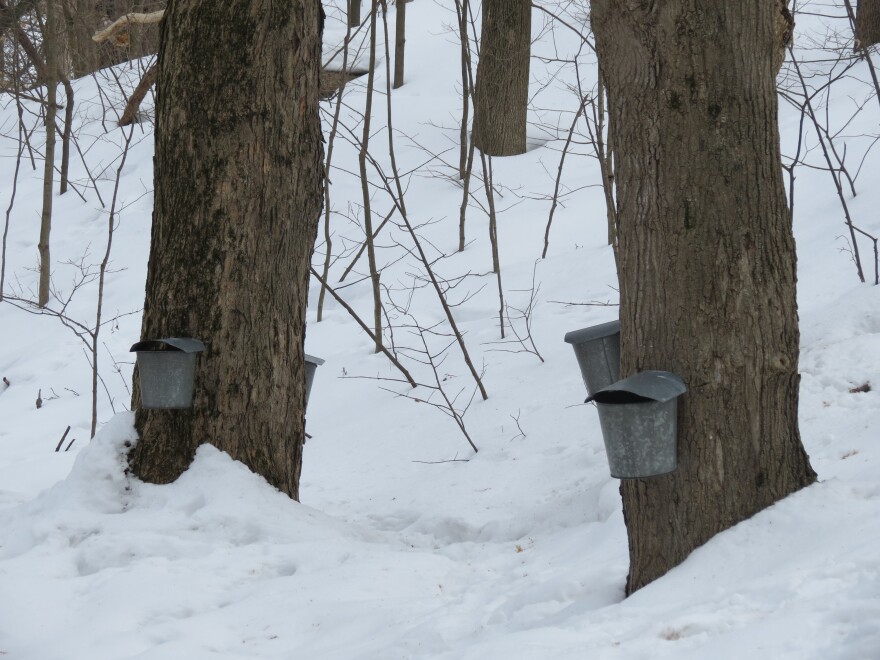As you’re shoveling your driveway this weekend, you might fancy a hot plate of pancakes at a local diner. But if the winter cold keeps up, you might have to fight your neighbor for that last drop of maple syrup.

For the 49th year in a row, the Kalamazoo Nature Center will host its Maple Sugar Festival this weekend. Complete with a pancake breakfast, pioneer sugaring demonstrations, and maple sugar tours.
The nature center jump started the tours last weekend. Dave Brown, exhibits coordinator at the Kalamazoo Nature Center, led Sunday’s tour.
He says as the sap comes out of the tree, it’s about 97 percent water.
“When we make it into syrup, it’s the easiest recipe in the world. You add nothing and take away water,” he says.
“When we do that, it gets down to about 66 percent sugar and about 33 percent water.”
The process is pretty simple too.
Find a sugar maple tree that’s at least 12 inches in diameter. Drill a hole, tap in the spile—the metal piece that makes the sap run out of the tree, collect the sap, and boil it for hours.
Brown says it’s been too cold to collect much sap for the sugaring.
“When we actually get weather where sap will flow, I think we’ll have a good run. I think it’ll flow and it’ll be a good season. Assuming that we continue to have cold night below freezing—the colder the better—and days above 40 degrees. That temperature difference makes it so we have the sap flow. It’s important that the nights stay cold though or else the trees will start to convert those sugars to starches and the sap doesn’t taste sugary anymore, it tastes bitter. And we call that buddy sap.”
The nights have been cold enough that the sap will probably stay sweet, it just might be a while until they can make maple syrup.
The Maple Sugar Festival is only a day away, but Brown says he’s not worried. The nature center mostly uses their sap for demonstrations. Communications Coordinator Lisa Panich says all of syrup for eating at the festival comes from Jack and Jill’s Maple Hill Farm in Paw Paw.
She says they bought 28 gallons of pure maple syrup from the farm’s harvest last year. And it’s a good thing they did, because Jack Brown of Jack and Jill Farm says they have about six thousand five hundred taps and they’ve barely gotten a drop this year:
“Normally what we look at is the middle of February we look at starting to tap and by first of March we’re making. This year we’re looking at first of March to think about tapping and middle of March of maybe making some syrup. If it warms up and stays cold at night, we could make syrup for another six weeks. It’s all weather dependent. If we don’t get those cold nights and warm days, we make nothing. If it stays cold, we make nothing. If it gets too warm with no freezing nights, we make nothing.”
Jack Brown says maple syrup accounts for about half of the money they get from the farm and a fourth of their livelihood.
Lisa Panich says everything at the Maple Sugar Fest should go as usual. Sap should be flowing for the demonstrations and there will be plenty of maple syrup to taste.
Enjoy it while you can. Tour guide Dave Brown says if we don’t reverse the affects of climate change, Southwest Michigan may not make this sweet topping for long.

“Because as we tend to warm up coming up in the near future the natural range of the sugar maples will change, but also we may not get those cold nights during spring and those warm days. If we don’t get that we won’t get the sap flow that we need for production or we’ll have a shorter season, reduced production," says Brown.
"There’s even some talk that we won’t have sugar maples surviving in this region anymore.”
Not a syrup fan? Dave Brown says these trees are also important for animals and plants in the sugar maple's ecosystem.



